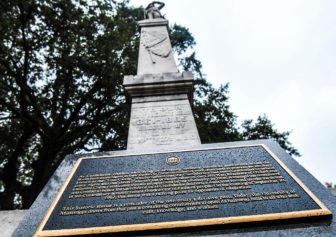

Bruce Newman, Oxford Eagle
The Confederate monument at the Circle at the University of Mississippi, in Oxford.
The Board of Trustees of the Institutions of Higher Learning has voted to relocate the Confederate monument at the University of Mississippi.
“The Board reviewed the detailed plans for the new site, considered events on college campuses across the South involving Confederate monuments, and listened to the university’s various constituency groups. The Board subsequently determined relocating the Confederate statue to be most appropriate for Ole Miss moving forward,” said Ford Dye, board president, in a press release sent out by IHL.
The board’s vote happened in the wake of national and statewide protests demanding racial equality, which includes ending the exaltation of Confederate iconography.
In 2019, a multiracial, bipartisan group of students engineered a plan to move the Confederate statue from its prominent place at the front of the Circle on University Avenue to the campus cemetery, where Confederate soldiers are buried.
During the time of that planning, a Memphis based group of neo-Confederates staged a march to the monument to “draw a line in the sand” over the actions the university has taken over the past two decades to remove or contextualize the traditions and monuments that glorified the Confederacy.
The plan was approved by University of Mississippi representative bodies comprised of undergraduate and graduate students, faculty, staff and administrators. Athletics Director Keith Carter also signed off on the monument’s relocation.
IHL halted this movement in January when board member Tommy Duff said he wanted more information from the university about it.
For its regular June meeting, a project proposal was submitted to IHL stating, “The university’s privately funded plan proposes relocation to the University Cemetery
because a cemetery is sacred ground that serves as the final resting place of the fallen. For that reason, cemeteries have long been deemed appropriate places for war
memorials … and the relocation of the monument immediately adjacent to the cemetery would place the monument in a broader and more proper historical context.”
Moving the monument is expected to cost $1.15 million, which will be privately funded.
As part of relocating the monument, the university will construct a well lit, brick path to the monument, which was put on the campus by the Daughters of the Confederacy in 1906.
A new marker will also be added to the cemetery to, “recognize the men from Lafayette County who served in the Union Army as part of the United States Colored Troops during the Civil War,” the proposal states.
Cameras will be installed around the cemetery to allow the University Police Department to monitor it.
“It’s great to see that all of our hard work did not go in vain and obviously I’m happy to see it’s been relocated,” said Arielle Hudson, one of the co-authors of the student resolution that put this entire process in motion.
Hudson added that she is having some concerns now that she has seen the university’s proposed plan for moving the monument.
“We do not want it to become a shrine. We’re still not trying to attract neo-Confederates and I hope they don’t see it as an opportunity to gather there,” Hudson said.
Josh Mannery, now Associated Student Body president at UM, was a member of the senate who approved the resolution that Hudson co-wrote.
“Thinking back on it, it’s still one of the coolest moments because there was such an air of something important happening that night,” Mannery said.
Mannery said he was relieved at IHL’s decision and that the students’ work culminated into something positive. Now that the monument will be relocated, “the ball is back in the university’s corner. Now we can start having conversations about other things that we can change like increasing representation in our faculty and staff, taking more firm stances on issues that marginalize our communities, normalizing a more inclusive Grove, and having conversations about equity.”
The post University of Mississippi to relocate Confederate monument appeared first on Mississippi Today.
- NAACP threatens to sue Elon Musk’s xAI over pollution in Mississippi - February 13, 2026
- School consolidation bill dies without a vote in Mississippi Senate - February 13, 2026
- In a village courtroom, a fervent prayer was answered for Ole Miss QB Trinidad Chambliss. But it took quite a while - February 13, 2026